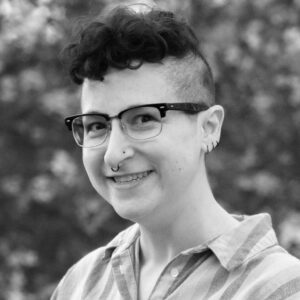by Sarah Rushakoff
Age: 20
Hometown: Memphis
Current City: St Andrew’s, Scotland
School: University of St Andrew’s
When did you realize you were trans?
These realizations came in waves for me. I identify as an agender trans man (he/him), which is where I think a lot of my confusion came from, because I never identified with any gender in the first place. I did not realize that I wouldn’t look like my dad as an adult until I received “The Care and Keeping of You” as a 10-year- old. Even then, I saw female puberty as more of a metamorphosis stage. It wasn’t until my body stopped changing around age 18 that I realized fully that I would not naturally develop the figure of an adult man, which feels silly looking back on it.
What were you like as a kid?
Once I start talking, I have a hard time stopping, so I learned quickly when to be totally silent and when to be chatty. I did not like sports, and did not identify with my peers, but felt positively toward every single person I knew, even if they did things to hurt me. I was deeply devoted to technical theater (particularly lighting) as I got older, and the light booth at my school became a sanctuary for me. I’m on the spectrum and found noisy common areas very upsetting, so having a place to be alone was essential.
Have you been bullied as a result of being out?
I’ve found that people will openly mock and bully you for being gay (especially as a teenager). They are more likely to just ignore and misgender you if you’re trans, which I would personally describe more as bigotry. The bullying never hurt, because I never felt like a woman anyway (I insisted on being referred to as gay rather than as a lesbian), but the misgendering does get to me because I feel so strongly about who I am now.
What’s an example of a situation where you really felt like you belonged?
This summer I spent most nights with my girlfriend and her two roommates, and all four of us fall under the trans umbrella. Being in a house where being LGBT wasn’t just accepted, but was rather the norm, was amazing. I would best describe it as feeling like a real person for the first time in my life.
Who has influenced you to be the person you are today?
Largely my parents, the Memphis theater community (especially Louisa Koeppel), and my therapists.
How has your personal style changed over the years?
When I was especially young, I would only wear dresses and skirts, something which is uncommon in stories of trans men, but they afforded me more mobility than jeans. After my parents started reminding me to be more ladylike in skirts, I refused to wear anything but pants and shorts. I still like dresses on occasion, but only if they have fun skirts, and only if I can guarantee that I won’t be seen as a woman while wearing them, so I tend to only wear them at school or when I’m alone.
What are some ways you’ve felt supported by adults in your life?
I was unsure about coming out at my summer job due to push back from my parents, but my bosses brought me into a meeting and encouraged me to do what would make me happy. I even found out that one of my coworkers has a son-in-law who is trans and has the same name as me! Both my therapists have been supportive and helpful, and having an OB-GYN who also does transgender healthcare has been vital because being seen and treated as a man while going through procedures necessary for female reproductive organs makes that experience so much more comfortable.
What do you hope to accomplish by the end of 2020?
By the end of 2020 my goal is to have my parents on board with my medical transition, and to have a consultation appointment booked to talk about top surgery.
What has your experience of transition been like so far?
My experience has been one largely of support from my friends and my community, both in Memphis and in Scotland. Cutting my hair in March for the first time was freeing. I never felt like I owned my body before that day. This connection to my body has driven me to care more about my health and has really made me feel so much more empowered than anything else in my life. I never cared about having accolades given to my dead name. But when I graduate from university and they award a degree to Lucas, I’ll finally feel like everything I’ve gone through in life has been worth it.
What’s studying abroad like?
Every moment is a new adventure. The UK appears more LGBT-friendly on the surface, but there’s actually far more discourse about trans rights there than in the U.S. at the moment (largely thanks to the writer of a famous book series, who I will not name). Our professors insist on being called by their first names, but also do not want to get to know us, so the atmosphere is one of distant familiarity. The most Scottish thing I’ve experienced was a bus driver stopping in the middle of his route to take a 10-minute smoke break in the rain.




